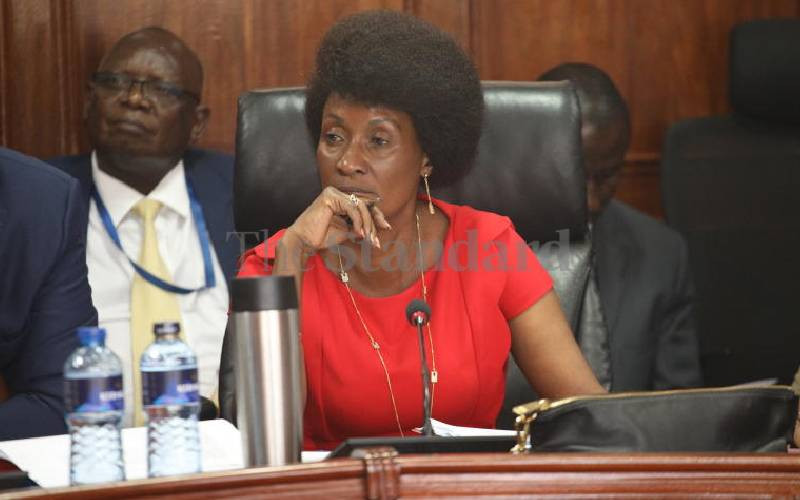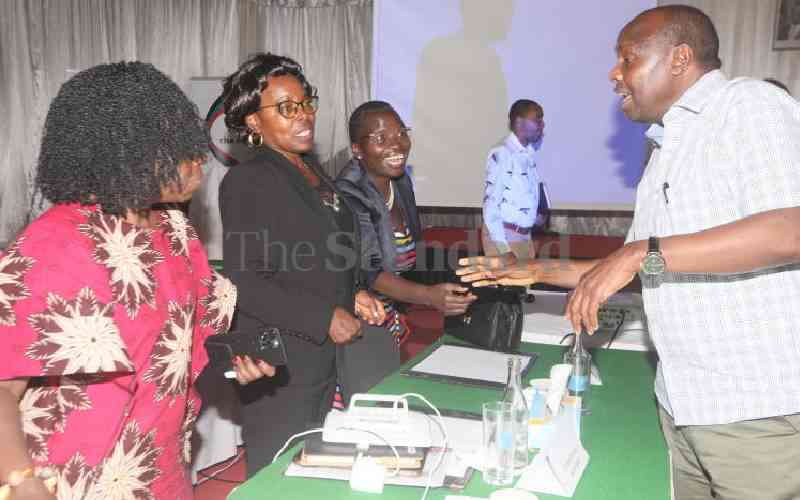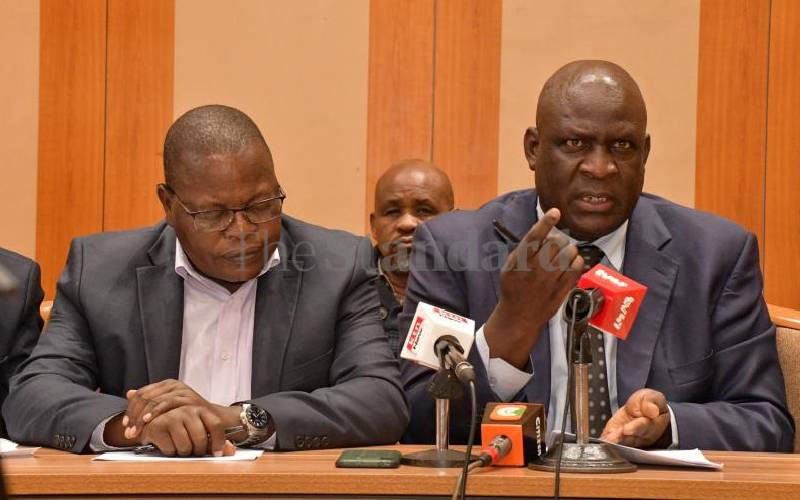The standoff between the Teachers Service Commission (TSC) and the Kenya National Union of Teachers (Knut) over insecurity in North Eastern Kenya has brought to the fore the simmering political rivalry in the frontier districts as the region’s elected leaders seize each other.
The politicians have been accused of illegally giving aliens Kenyan citizenship at the expense of quality education, which has heightened insecurity.
From personal accounts of teachers who last week fled North Eastern Kenya after schools opened this year over attacks, it is like the government and its security machinery have given up as insecurity thrives. The leash on the hushed truth about the situation in north-eastern is gradually being lifted. The teachers blame elected leaders for their plight, whom they accuse of fanning the sour relations they have with locals and their students.
After five of the eight teachers who agreed to go back to work returned to Nairobi after they were either beaten up or ordered to leave Garissa, Joel Musungu, their spokesman faulted the government for not keeping tabs on criminal activities of elected leaders in the three affected counties.
“Last year, I had 90 students enrolled for Kenya Certificate of Primary Education. Only 60 occasionally attended school. The other 30 were Somalis who returned to sit Kenyan examinations. When examinations results are released, elected leaders use the certificates and results slips to acquire Kenyan national identity cards,” says Musungu.
The teachers gave The Standard on Saturday names of several elected leaders, some of who have been vocal telling off Knut over the teachers’ fears and demanding their sacking.
Asked if the Teachers Service Commission (TSC) would consider information on the political leaders implicated by the teachers, the commission’s head of communication Kihumba Kamotho was non-committal, only responding curtly: “The question should be directed to the relevant government agency. The issues raised do not fall within the mandate of TSC.”
Kamotho denied that TSC has information about physical assault on the five teachers; two women, three men and a nurse.
He says: “With regard to Garissa, I have confirmed that no allegations of assault have been reported to our director who is on the ground or the police.”
Such is the situation that befell Augustine Musitia, a teacher at Mandera Primary School, who was assaulted by members of the Degodia clan for teaching Garre children. Garre is the dominant clan.
After allegedly resisting Sh200,000 bribe from a former minister in the last government not to proceed with the matter in court, he was threatened with death, which forced him to flee. The assailant, a parent, was eventually arrested and charged with assault. The matter is contained in Occurrence Book at Mandera Police Station and referenced as OB/16hrs/16/03/02/2015.
The teachers say they took off following warnings that some elected leaders from the two clans were massing weapons and manpower from Somalia. The Standard on Saturday had no way of independently verifying the allegations, but the tension between the two clans that last year clashed sporadically is well-documented.
When the same question about teachers being used as pawns in the inter-ethnic fighting between the two communities in Garissa, is put to a senior officer in the county government, he denied the allegation.
“The only fighting witnessed in Garissa was early last year. But this involved Amisom troops from Liberia who were making merry away from the battlefield,” he said.
He, however, did own up that a “high ranking man in government who rigged election” has been giving the three counties a bad reputation.
Stay informed. Subscribe to our newsletter
“The leader has been feeding the president with lies. President Uhuru Kenyatta was supposed to tour the three counties in November last year but the visit was put off because people on the ground are not happy,” the officer said on phone.
During his recent visit to Wajir, Deputy President Ruto waded into local politics when he sided with MPs who have been calling for termination of the services of teachers.
Local leaders have ‘reportedly’ advised the president and his deputy that making concession to teachers was tantamount to bending over to opposition demands on security.
Reached for a comment, Garissa Governor Nathif Jama said the three counties had through Council of Governors petitioned the President to devolve education in the region on “pilot basis” as a way of correcting existing imbalance in access to education in the county.
“We cannot allow our children to be taken ransom by few individuals, we North Eastern Kenya leaders must show leadership and come up with an immediate solution,” said Jama.
“We are disadvantaged in terms of education and it is extremely unacceptable and unfair for someone to deny our children their right to education, if given to us, we will change the way education matters are conducted,” he added.
North Eastern is a Jubilee stronghold, with United Republican Party (URP) as the dominant party.
Describing how she and four colleagues were forced to flee Garissa last week after heeding a government pledge on their personal safety and security, a female teacher from Machakos pinpoints three things elected leaders in Garissa, Wajir and Mandera fiercely fight over to retain support.
“National identity cards, CDF and relief food. The three items are hot election issues. If you can deliver IDs to aliens, allocate more CDF to areas dominated by your clan, you are guaranteed of re-election,” says the teacher.
In her school, she says, a good number of pupils come from Ras Kamboni and Kismayu in Somalia. They register for Kenyan examinations after which they go back to their country, resurfacing at the end of the year to sit the examinations, she explains.
“It does not matter what score they get. All they want to is the examinations certificate which they use as evidence to apply for Kenyan IDs or passports. We know this, that is why we are treated with suspicion,” says the teacher.
In 2009, then minister for Planning and Vision 2030 was forced to cancel national census results questioning rapid rise in population in North Eastern.
Majority of the so-called ‘down Kenya teachers’ hail from Western, Nyanza and Rift Valley, region politically deemed to be opposition strongholds. Now, the teachers complain of how politics has coloured the truth about threats to their security. They are also accused of being sympathetic to Coalition for Reforms and Democracy (CORD).
Thus the elected leaders make them unwanted, hence the mathu mathu, nguraru or kaffir tags, which translate to heathen or a people of a lower caste. We caught up with five of the eight teachers and nurse who had travelled to their work stations in Garissa County ahead of the January 25 deadline issued by Cabinet Secretary for Education Jacob Kaimenyi.
“We traveled by bus to Garissa. It took us 10 hours travelling through forests and bushes. We had no police escort as had been promised by the government. Upon reaching our work stations in Garissa, the local militia came to warn us of the risks if we remained in our schools. Two of our male colleagues and a nurse working in local health centre were assaulted and told to leave,” says a female teacher.
One on male teachers said he recorded a statement at Garissa Police Station after the attack, an incident that occurred when he reported to school. He is accused of preventing their children from cheating in examinations.
 The Standard Group Plc is a
multi-media organization with investments in media platforms spanning newspaper
print operations, television, radio broadcasting, digital and online services. The
Standard Group is recognized as a leading multi-media house in Kenya with a key
influence in matters of national and international interest.
The Standard Group Plc is a
multi-media organization with investments in media platforms spanning newspaper
print operations, television, radio broadcasting, digital and online services. The
Standard Group is recognized as a leading multi-media house in Kenya with a key
influence in matters of national and international interest.
 The Standard Group Plc is a
multi-media organization with investments in media platforms spanning newspaper
print operations, television, radio broadcasting, digital and online services. The
Standard Group is recognized as a leading multi-media house in Kenya with a key
influence in matters of national and international interest.
The Standard Group Plc is a
multi-media organization with investments in media platforms spanning newspaper
print operations, television, radio broadcasting, digital and online services. The
Standard Group is recognized as a leading multi-media house in Kenya with a key
influence in matters of national and international interest.








